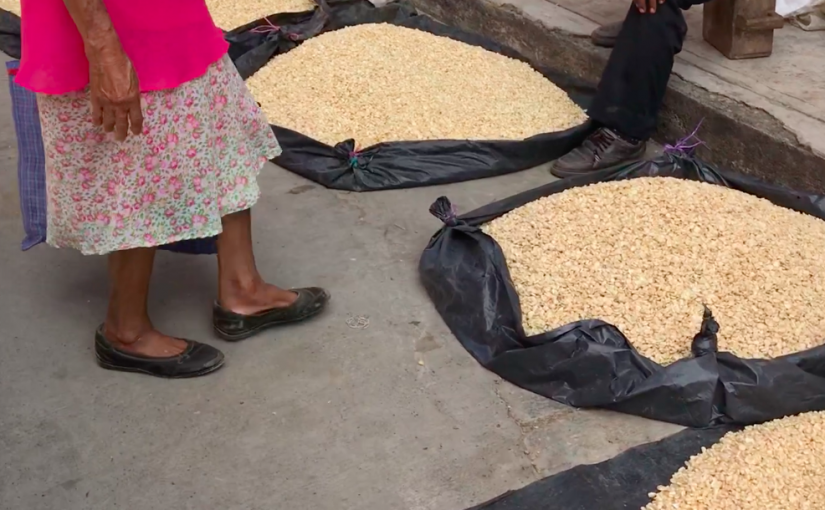In this lesson we will introduce diminutive particles, which are used to refer to small things and also to mark reverence to a person or object. For example:
Tlatōcaxtiliztli tlen ax quipiya ītecoh (Absolute Substantive Nouns)
Nouns take diminutive prefixes and suffixes: The prefix “pil-” and the suffixes “-tzin” in the singular, and “-tzitzin” for the plural.
ni – pil – (substantive base) – tzin
ti – pil – (substantive base) – tzin
ø – pil – (substantive base) – tzin
ti – pil – (substantive base) – tzitzin
in – pil – (substantive base) – tzitzin
ø – pil – (substantive base) – tzitzin
Tlamanēxtilli ahāhuiltiliztli tlen tlatōcaxtiliztli tlen ax quipiya ītecoh (Example of the conjugation of substantive nouns)
Nipilcihuātzin “I am a little woman”
Tipilcihuātzin “You are a little woman”
Tipilcihuātzitzin “We are little women”
Inpilcihuātzitzin “You (plural) are little women”
Tipilpapalotzin “You are a little butterfly”
Inpilpapalotzitzin “We are little butterflies”
Tipilxilitzin “You are a little shrimp”
Inpilxilitzitzin “You (plural) are little shrimps”
Tipilchichitzin “You are a little dog”
Inpilchichitzitzin “You (plural) are little dogs”
Titlapiyaltzin “You are a little domesticated animal”
Inpiyaltzitzin “You (plural) are little domesticated animals”
Motocaxtilli tlen quipiya iteco (Possessive pronouns)
The diminutive form of possessive pronouns is marked with “pil-” in the same way as the absolute substantive nouns. However, the possessive markers are used for the prefixes and suffixes, rather than the absolute subject markers (ni, ti, ø, ti, in, ø). This means that the subject is marked by their possessed form (no, mo, i, to, inmo, inin), while also using their possessed singular (-uh, -hui, ø) and plural (-huan) suffixes. Diminutive possessive pronouns are used mainly for family members, parts of the body, and the possession of an object.
no – pil – (substantive base) – uh /hui /ø
mo – pil – (substantive base) – uh /hui /ø
i – pil – (substantive base) – uh /hui /ø
to – pil – (substantive base) – huan
inmo – pil – (substantive base) – huan
inin – pil – (substantive base) – huan
Tlamanextilli ahahuiltiliztli tlen motocaxtilli tlen quipoz iteco (Ejemplo de la conjugacion del substantivo posesivo)
mopilahui “your little aunt”
ipolahui “her/his little aunt”
topilahuihuan “our little aunts”
inmopilahuihuan “your (plural) little aunts”
ininpilahuihuan “their little aunts”
mopiltonanan “your revered mother”
ipiltonanan “her/his revered mother”
topiltonanahuan “our revered mothers”
inmopiltonanahuan “your (plural) revered mothers”
ininpiltonanahuan “their revered mothers”
mopilcin “your little corn”
ipilcin “her/his little corn”
topilcinhuan “our little corns”
inmopilcinhuan “your (plural) little corns”
ininpilcinhuan “their little corns”
mopilcuaxilouh “your little banana”
ipilcuaxilouh “her/his little banana”
inmopilcuaxilouhuan “your (plural) little bananas”
ininpilcuaxilouhuan “their little bananas”
mopilicxi “your little foot”
ipilicxi “her/his little foot”
inmopilicxihuan “your (plural) little feet”
ininpilicxihuan “their little feet”
mopiltzipiuh “your little belly button”
ipiltzipiuh “her/his little belly button”
inmopiltzipiuh “your (plural) little belly button”
ininpiltzipiuh “their little belly button”
Tequitl cē (Activity One): Write five sentences with words that have “pil-” and “-tzin”
Tequitl ōme (Activity Two): Translate the following sentences into Nahuatl.
My little bean is very beautiful.
The teeth of your little corn is too big for planting.
Our reverend grandfather works a lot at the cornfield.
This tree of little bananas that our son planted is growing very beautiful.
The little candles that were lit at the altar for corn will be put away.
